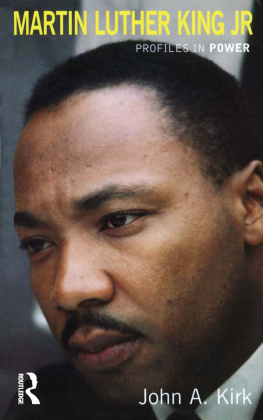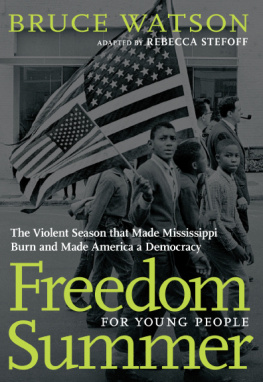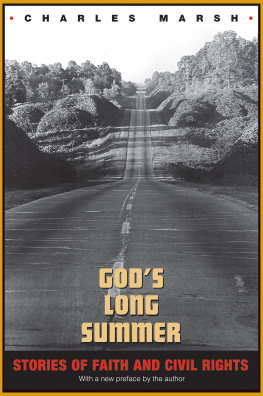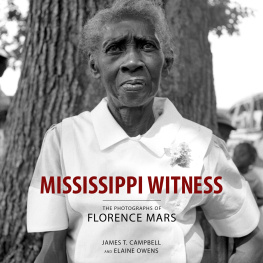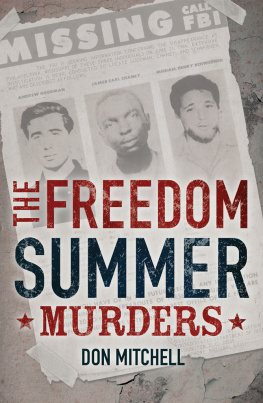www.upress.state.ms.us
The University Press of Mississippi is a member of the Association of American University Presses.
All photograph captions are transcriptions of Rev. Ed Kings handwritten notes on the backs of the photographs. Ed King Collection, Mississippi Department of Archives and History, Jackson, Mississippi. PI/1984.0018/Box 57/Folder 1.
Copyright 2014 by University Press of Mississippi
Photographs Rev. Ed King
All rights reserved
Manufactured in Canada
First printing 2014
Library of Congress Cataloging-in-Publication Data
King, Ed, Rev., 1936
Ed Kings Mississippi : behind the scenes of freedom summer / Rev. Ed King and Trent Watts.
pages cm.
Includes index.
ISBN 978-1-62846-115-2 (cloth : alk. paper) ISBN 978-1-62846-116-9 (ebook)
1. African AmericansCivil rightsMississippiHistory20th century. 2. Civil rights movementsMississippiHistory20th century. 3. MississippiRace relationsHistory20th century. 4. King, Ed, Rev., 1936 5. Civil rights workersMississippiBiography. I. Watts, Trent, 1965 II. Title. III. Title: Behind the scenes of freedom summer.
E185.93.M6K46 2014
323.092dc23
[B] 2014010367
British Library Cataloging-in-Publication Data available
ACKNOWLEDGMENTS
I DEEPLY APPRECIATE THE SUPPORT AND ENCOURAGEMENT OF FAMILY and friends, especially my brother, Alan; my physician friend, Dr. Robert Smith; the Rev. Sam Tomlinson; Todd Pyles; Les Dunbar; Dr. Ham Benghuzzi and Dr. Jessica Bailey, of the School of Health Related Professions of the University of Mississippi Medical Center; Craig Gill and staff of the University Press of Mississippi; and my co-author, Dr. Trent Watts, who had the original concept for this kind of book.
This book is dedicated to we few, we happy few, we band of brothers and sisters, on the way to the Promised Land, to Freedom Land, and to the Beloved Community.
EK
WRITING THIS BOOK HAS BEEN A GREAT PLEASURE. I THANK THE MANY people who were generous with their assistance, their friendship, or both. Craig Gill at the University Press of Mississippi has been supportive, patient, and encouraging since I told him about this project several years ago at a Mississippi Historical Society meeting in Jackson. He, John Langston, and others at the press have made me want to work with them again, and I hope to have the opportunity to do that with future projects. Readers of the manuscript offered valuable suggestions for improvements. I hope that I have made good use of their many useful comments and recommendations. Thanks also to Anne Stascavage and Carol Cox.
At the Missouri University of Science and Technology, students Trista Bruning, Courtney Rose, Augusta Turner, Cassie Rizzo, and Sherry Smith supplied valuable assistance. Special thanks to Stephanee Walker for her diligent work. Also here at Missouri S & T, colleagues and librarians have made work easier and life in general more pleasant. At the Curtis Laws Wilson Library, Marsha Fuller, June Snell, Chris Jocius, Mary Haig, and Sherry Mahnken were great at helping me obtain books and other material. Chris pointed me toward many relevant materials that otherwise I would have missed.
In the English Department, Linda Sands always has a smile that makes it nice to come to work. Thanks also to colleagues Kris Swenson and Anne Cotterill for their kind interest in this project and for listening to me talk about it. Jack Morgan, on the other hand, should be ashamed of himself for retiring and moving away. I miss his sense of humor, scholarly example, and broad learning. All of us in the department miss our good friend and colleague John Lemmermann, the loss of whom we still keenly feel.
Scholars writing Mississippi history are fortunate to be able to work in the William F. Winter Archives and History Building in Jackson, home of the Mississippi Department of Archives and History. Archivists and librarians there provided much support for this project. When I asked Anne Webster if she knew how I might locate Rev. Ed King, she suggested that I should look near her on Sunday mornings in Jacksons Galloway Memorial United Methodist Church. Thanks as well to Hank Holmes, Grady Howell, Clinton Bagley, and Celia Tisdale. Clarence Hunter deserves special recognition, too, for his work in caring for the MDAHs invaluable collection of Tougaloo College civil rightsrelated material. I also wish to thank Ainsley Powell and Pamela Williamson for their assistance at the J. D. Williams Library at the University of Mississippi, a campus I never tire of visiting.
My greatest debt is of course to Rev. Edwin King himself. He has offered enthusiastic assistance and guidance and was generous with his time while I prepared this manuscript. For that help I am most thankful. As a native Mississippian, I am even more grateful for the courage he showed in attempting to open a closed society during the years covered in this book. Growing up in Mississippi in the 1970s and 1980s, I had no idea of the conditions that had prevailed in the 1960s.
I am fortunate to know Steve Reich and Ron Granieri, good historians and even better companions. I also want to thank Lindgren Johnson for her friendship and help during some challenging times. And thanks again to my good friend Vance Poole; a brief word does not begin to acknowledge my debt to him. At the University of Mississippi, Joan Wylie Hall was a masterful, inspiring teacher; her encouragement over the years has been a blessing.
This is the first of my books to have been written since my wife, Jennifer, came into my life. I thank her again for her love and her patience with all my many faults. My children, Jack and Ellie, continue to be sources of great joy. Because of the sacrifices made by Ed King and others in that summer of 1964, the Mississippi that we visit to see their grandparents looks much different from the Mississippi that they will see and read about in this book. Thanks also to my mother for her continued support and love. Finally, I am especially glad to be able to dedicate this book to my father, for whom the year 1964 has special significance.
TW
Ed Kings Mississippi
INTRODUCTION
TRENT WATTS
The Lord saw it, and it displeased Him that there was no justice.
ISAIAH 59:15
THE LONG HOT SUMMER IS ABOUT TO BEGIN, WROTE REV. EDWIN KING, chaplain of Mississippis Tougaloo College, to a fellow Methodist minister on May 29, 1964.
The Mississippi Summer Project, as the initiative was initially called by movement workers, provoked a scathing, indignant reaction from many white Mississippians, who viewed the civil rights work that summer as nothing less than an invasion. Congressman Thomas G. Abernathy wrote: Agitators in the civil rights movement, all mature adults, have for months been carefully mapping strategy and tactics for disorder in our State. Governor Paul B. Johnson Jr., who campaigned for election in 1963 largely on his opposition as lieutenant governor to James Merediths 1962 racial integration of the University of Mississippi, said of the summer project: We are not going to allow a group of outsiders to come in and drive a wedge into the unity of


